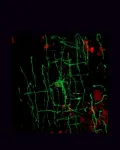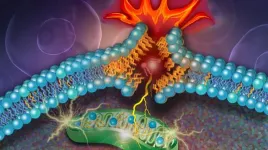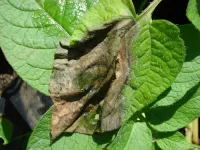AIBS names 2024 emerging public policy leaders
Yale University and Iowa State University graduate students recognized
2024-02-15
(Press-News.org) The American Institute of Biological Sciences (AIBS) is pleased to announce that Alex Rich and Efraín Rodríguez-Ocasio have been selected to receive the 2024 AIBS Emerging Public Policy Leadership Award (EPPLA). The award recognizes graduate students in the biological sciences who have demonstrated leadership skills and an aptitude for working at the intersection of science and public policy.
Alex Rich is a Ph.D. student in neuroscience at Yale University in New Haven, Connecticut. Her research focuses on decision-making and disordered eating. Specifically, she seeks to understand the neural basis of food choices to inform binge eating disorder treatments. At Yale, Rich co-chairs the Advocacy Committee in the Graduate and Professional Student Senate, where she serves as a liaison between graduate students and university administration to advocate for policy change. Furthermore, Rich is also engaged in national science education policy issues as Secretary of the Graduate Research and Development (GRAD) Coalition, the student arm of the GRAD Caucus in the US House of Representatives. In this role, she helped organize a congressional briefing on graduate student mentorship. Rich earned her bachelor's in neuroscience from the University of Minnesota (UMN), where she also helped compile neuroscience research to support trauma-informed campus policy development as a member of the UMN Provost’s Council on Student Mental Health.
Efraín Rodríguez-Ocasio is a Ph.D. Candidate in chemical and biological engineering at the Iowa State University (ISU) in Ames, Iowa. His doctoral research focuses on microbial utilization of plastic waste that has been subjected to thermal oxo-degradation. At ISU, Rodríguez-Ocasio served as engagement officer for the Graduate and Professional Student Senate, where he coordinated advocacy efforts for graduate student interests at the state and federal level. He is an active member of several committees for the Society for Industrial Microbiology and Biotechnology (SIMB), including the Policy and Advocacy; Membership; and Diversity, Equity, and Inclusion (DEI) committees. At SIMB, he also serves on the Connecting Microbiome Communities (CMiC) Steering Committee and will chair the Microbiome Policy, Advocacy and Regulation session at the inaugural meeting this year. Rodríguez-Ocasio received his bachelor's in industrial biotechnology from the University of Puerto Rico at Mayagüez, where he also served as a trustee and member of the governing board.
Rich applied for the EPPLA because she is passionate about supporting future biologists’ academic and scientific endeavors through federal advocacy. “What I find most fulfilling is translating newfound understandings of the world into a framework for tangible change,” she said. Rodríguez-Ocasio pursued the award for the opportunity to advocate for science, gain new skills, and build a professional network in the science policy community. “I am passionate about science in the service of society, and this award offers a bridge to opportunities where I can use my background to help shape the scientific response to national and global problems,” he said.
Both the awardees think it is critical for scientists to engage in policy. “When scientists communicate their research and that of their peers beyond the lab, the impacts of biological research become woven into the fabric of society in a way that addresses pressing issues and permeates everyday life,” argues Rich. Rodríguez-Ocasio believes that “it is vital to keep policymakers informed of the value created by the science they funded and remind them that scientific discovery is in the national interest because few things have pushed this country forward as science has.”
This is the 21st year the EPPLA program has recognized emerging student leaders in science policy. “We are proud to recognize graduate students from across the country who have demonstrated tremendous leadership potential in science advocacy,” said Scott Glisson, AIBS Chief Executive Officer. “Alex and Efraín join an accomplished group of EPPLA awardees who are playing an important role in bridging the gap between science and policy.”
Rich and Rodríguez-Ocasio will travel to Washington, DC, in April to participate in an AIBS science communications training program and to meet with their members of Congress as part of the annual AIBS Congressional Visits Day. In addition, they will receive a one-year subscription to the scientific journal BioScience.
AIBS is also recognizing two additional outstanding leaders with an Honorable Mention award. Hannah Henry is a master’s student in natural resources at Auburn University in Auburn, Alabama. Harrison Watson is a Ph.D. student in ecology and evolutionary biology at Princeton University in Princeton, New Jersey. Henry and Watson will receive a one-year subscription to BioScience.
AIBS is the national organization dedicated to promoting informed decision-making that advances the biological sciences for the benefit of science and society. The EPPLA program is one way that AIBS builds the capacity of the scientific community to promote sound decision-making.
The EPPLA program is made possible by the generous financial support of AIBS donors. More information about the EPPLA program and AIBS is available at https://www.aibs.org/.
-END-
END
[Attachments] See images for this press release:


ELSE PRESS RELEASES FROM THIS DATE:
2024-02-15
By integrating an ensemble of privacy-preserving algorithms, a KAUST research team has developed a machine-learning approach that addresses a significant challenge in medical research: How to use the power of artificial intelligence (AI) to accelerate discovery from genomic data while protecting the privacy of individuals.[1]
“Omics data usually contains a lot of private information, such as gene expression and cell composition, which could often be related to a person’s disease or health status,” says KAUST’s Xin Gao. “AI models trained on this data – particularly deep learning models – have the potential to retain private ...
2024-02-15
You’d think the complex flavor in a quality cup of tea would depend mainly on the tea varieties used to make it. But a study appearing in the journal Current Biology on February 15 shows that the making of a delicious cup of tea depends on another key ingredient: the collection of microbes found on tea roots. By altering that assemblage, the authors showed that they could make good-quality tea even better.
“Significant disparities in microbial communities, particularly nitrogen metabolism-related microorganisms, were identified in the roots of tea plants with varying qualities through ...
2024-02-15
Cell Press, Cell Signaling Technology (CST), and the Elsevier Foundation are proud to announce the winners of the 4th annual Rising Black Scientists Awards: Jaye Wilson of Yale University, Kevin Brown Jr. of California State University San Marcos, Senegal Mabry of Cornell University, and Akorfa Dagadu of the Massachusetts Institute of Technology.
This year had the greatest number of submissions thus far, with the winners being selected from a pool of more than 350 applicants from across the life, health, physical, earth, environmental, and data sciences. Essays from the winners and honorees appear in the journals Cell and ...
2024-02-15
Researchers report February 15 in the journal Cell that ancient viruses may be to thank for myelin—and, by extension, our large, complex brains. The team found that a retrovirus-derived genetic element or “retrotransposon” is essential for myelin production in mammals, amphibians, and fish. The gene sequence, which they dubbed “RetroMyelin,” is likely a result of ancient viral infection, and comparisons of RetroMyelin in mammals, amphibians, and fish suggest that retroviral infection and genome-invasion ...
2024-02-15
Columbia researchers have found that a rare type of lipid is a key driver of ferroptosis, a form of cell death discovered by Columbia professor Brent Stockwell.
The findings provide new detail on how cells die during ferroptosis and could improve understanding of how to stop ferroptosis in contexts where it is harmfully occurring– in neurodegenerative diseases, for example– or induce it in contexts where it could be useful, such as using it to kill dangerous cancer cells.
The new research found that a rare type of ...
2024-02-15
The first accurate maps of outbreaks of potato blight — a disease caused by the fungus-like pathogen Phytophthora infestans that was responsible for the Irish potato famine between 1845 and 1852 — in the USA between 1843 and 1845 are presented in a study published in Scientific Reports. The findings improve our understanding of the spread of potato blight before the disease reached Europe.
Jean Ristaino and colleagues mapped outbreaks of potato blight in North America between 1843 and 1845 by analysing historic agricultural reports published in the USA during this period. The authors found that the disease was first reported ...
2024-02-15
An innovative treatment significantly increases the survival of people with malignant mesothelioma, a rare but rapidly fatal type of cancer with few effective treatment options, according to results from a clinical trial led by Queen Mary University of London.
The phase 3 clinical trial, led by Professor Peter Szlosarek at Queen Mary and sponsored by Polaris Pharmaceuticals, has unveiled a breakthrough in the treatment of malignant pleural mesothelioma (MPM), a rare and often rapidly fatal form ...
2024-02-15
About The Study: In this study of primary-care patients with obesity, all weight management treatments (nutrition counseling, very low-calorie meal replacement, anti-obesity medications, and bariatric surgery) increased the patient-level probability of achieving 5% or greater weight loss, but current rates of utilization are low and insufficient to reduce weight at the population level.
Authors: Dina H. Griauzde, M.D., M.Sc., of the University of Michigan in Ann Arbor, is the corresponding author.
To access the embargoed study: Visit our For The Media website at this link https://media.jamanetwork.com/
(doi:10.1001/jamanetworkopen.2023.56183)
Editor’s ...
2024-02-15
About The Study: Moderate or severe and penetrating traumatic brain injury (TBI) were associated with the subsequent development of brain cancer in this study of more than 1.9 million veterans of the Iraq and Afghanistan wars. However, mild TBI was not associated with later brain cancer diagnoses.
Authors: Ian J. Stewart, M.D., of the Uniformed Services University of Health Sciences in Bethesda, Maryland, is the corresponding author.
To access the embargoed study: Visit our For The Media website at this link https://media.jamanetwork.com/
(doi:10.1001/jamanetworkopen.2023.54588)
Editor’s ...
2024-02-15
North Carolina State University researchers used text analytics on both historic and modern writing to reveal more information about the effects and spread of the plant pathogen – now known as Phytophthora infestans – that caused the 1840s Irish potato famine and that continues to vex breeders of potatoes and tomatoes.
The study examined keyword terms like “potato rot” and “potato disease” after digitizing historic farm reports, news accounts and U.S. Patent Office agricultural records from 1843 ...
LAST 30 PRESS RELEASES:
[Press-News.org] AIBS names 2024 emerging public policy leaders
Yale University and Iowa State University graduate students recognized






